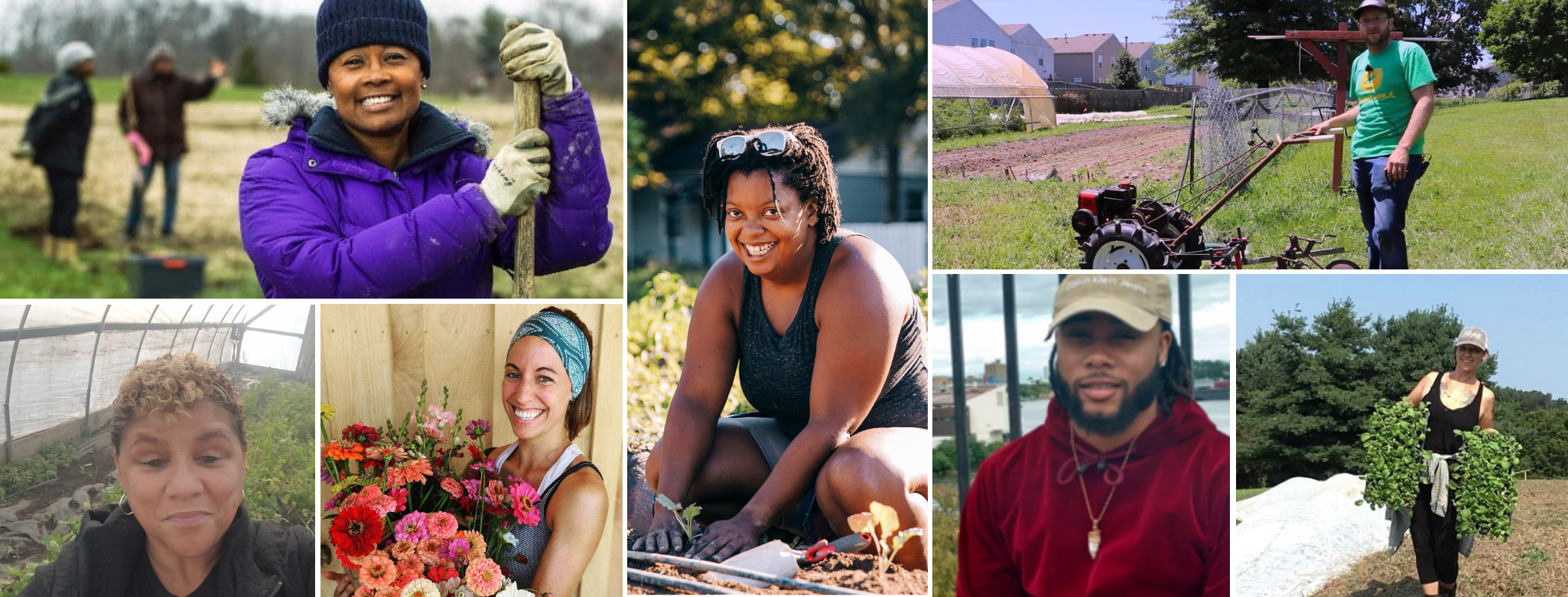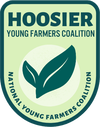Our 2021 Fellows (pictured above, clockwise from top left): Sharrona Moore, Danielle Guerin, Daniel Garcia, Sarah Dillon, DeAnthony Jamerson, Maeve Smith, and Frieda Graves
We were genuinely floored by the caliber of applicants in Year 2 of our Fellowship. Twenty eight beginning farmers applied, telling us about their success so far - and what they're planning next as they grow their farms.
Here is a special thank you to everyone who put themselves out there and applied. Reading your applications makes us proud and hopeful and confident about the future of food and farming and community in Indiana.
We also want to thank the committee who reviewed all of the applications and had the pain-staking job of selecting just seven farmers: Genesis McKiernan-Allen of Full Hand Farm, Andrew Raridon of Valparaiso University, Nate Brownlee of Nightfall Farm, and Victoria Beaty of Growing Places Indy. And most of all, a huge thank you to the anonymous donors who make the Fellowship possible.
This year's Fellows will spend the next year connecting, troubleshooting, and cheering each other on as they tackle big projects on their farms. (Each Fellow receives $5,000 to put towards those big projects.) Our 2021 Hoosier Beginning Farmer Fellows are:
Here is a special thank you to everyone who put themselves out there and applied. Reading your applications makes us proud and hopeful and confident about the future of food and farming and community in Indiana.
We also want to thank the committee who reviewed all of the applications and had the pain-staking job of selecting just seven farmers: Genesis McKiernan-Allen of Full Hand Farm, Andrew Raridon of Valparaiso University, Nate Brownlee of Nightfall Farm, and Victoria Beaty of Growing Places Indy. And most of all, a huge thank you to the anonymous donors who make the Fellowship possible.
This year's Fellows will spend the next year connecting, troubleshooting, and cheering each other on as they tackle big projects on their farms. (Each Fellow receives $5,000 to put towards those big projects.) Our 2021 Hoosier Beginning Farmer Fellows are:
Sarah Dillon, Rainfield Farm, www.rainfieldfarm.com
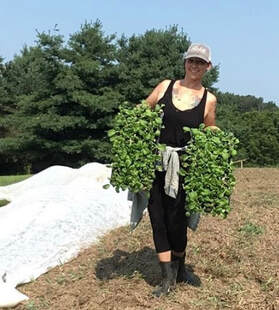
Our farm currently sells to 8 grocery stores, has an 85 person CSA, an onsite farmstand, sells online, and has a pop-up farm store during the summer months.
Community involvement and eliminating food waste have always been at the forefront of our ever evolving plan. This year we worked with PAX Center (LaPorte, IN) and Cultivate Food Rescue (South Bend, IN) and donated just over 1000 pounds of produce. We also partnered with a female owned coffee shop, Smalltown, to create our own “Farm Blend” coffee and donated the proceeds to Urban Growers Collective (Chicago, IL).
Something that has always been important to me as a female farmer was to somehow get more women involved in farming that may have been in a similar position as to where I was 8 years ago...interested in farming, seeking another way of life, and being a part of a kick-a$$ lady team. This year we hired four very determined yet inexperienced women aging from 18 - 28 years old. Two of these women will be back this season and we are hoping that with the proper scaling up , we will be able to keep them on as full time year round, salaried employees.
Community involvement and eliminating food waste have always been at the forefront of our ever evolving plan. This year we worked with PAX Center (LaPorte, IN) and Cultivate Food Rescue (South Bend, IN) and donated just over 1000 pounds of produce. We also partnered with a female owned coffee shop, Smalltown, to create our own “Farm Blend” coffee and donated the proceeds to Urban Growers Collective (Chicago, IL).
Something that has always been important to me as a female farmer was to somehow get more women involved in farming that may have been in a similar position as to where I was 8 years ago...interested in farming, seeking another way of life, and being a part of a kick-a$$ lady team. This year we hired four very determined yet inexperienced women aging from 18 - 28 years old. Two of these women will be back this season and we are hoping that with the proper scaling up , we will be able to keep them on as full time year round, salaried employees.
Daniel Garcia, Garcia’s Gardens, www.garciasgardens.com
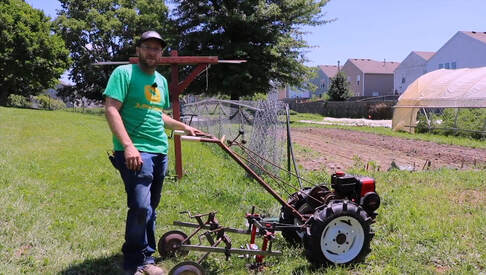
Our urban farm sells vegetables, flowers, wood products, maple syrup, plants, microgreens, and foraged items through farmers markets, restaurants, and several online markets. We have also partnered with a local beekeeper. We work with local growers which seem to be growing in number recently. I volunteer for a local coop and participate on a couple advisory boards through Purdue University. We host tours and workshops for schools and fellow farmers.
We have been farming this plot commercially for 5 years. The farm is no longer just our family running it. It's definitely dependent on the great team we've developed over the years. And tapping into the team's strengths is the key to success. It helps the farm grow into a more efficient and funner place to work.
We have been farming this plot commercially for 5 years. The farm is no longer just our family running it. It's definitely dependent on the great team we've developed over the years. And tapping into the team's strengths is the key to success. It helps the farm grow into a more efficient and funner place to work.
Frieda Graves, Faith Farms and Orchard, www.faithgary.org
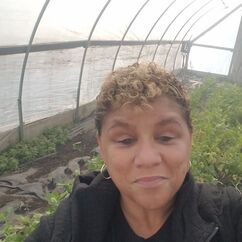
Our urban farm in Gary grows a variety of fruit, vegetables and herbs throughout the growing season. We also keep bees and raise chickens, ducks and goats. While we are not a certified organic farm, we use only organic growing practices. We sell our produce, eggs and honey to the general public at the Farm and at community Farmer's Markets.
We have been farming for seven years at FAITH Farms & Orchard, and we are constantly engaging the community (church, schools, and other non-profit organizations) in the work that we do.
In the past year, we have partnered with the YWCA to teach the youth in their summer program about Urban Farming. We have also partnered with the local Hospital system on a Farm-to-Table event that feed over 200 people at no costs to the community. The goal was to educate the community on how to cook healthy soul food. At this event we provided recipe cards to all attendees so that they could learn to cook healthy meals at home. We partner with NWI Community Action and serve as a site for their Senior Voucher and WIC Voucher programs.
We have been farming for seven years at FAITH Farms & Orchard, and we are constantly engaging the community (church, schools, and other non-profit organizations) in the work that we do.
In the past year, we have partnered with the YWCA to teach the youth in their summer program about Urban Farming. We have also partnered with the local Hospital system on a Farm-to-Table event that feed over 200 people at no costs to the community. The goal was to educate the community on how to cook healthy soul food. At this event we provided recipe cards to all attendees so that they could learn to cook healthy meals at home. We partner with NWI Community Action and serve as a site for their Senior Voucher and WIC Voucher programs.
Danielle Guerin, Soul Food Project, www.soulfoodprojectindy.org
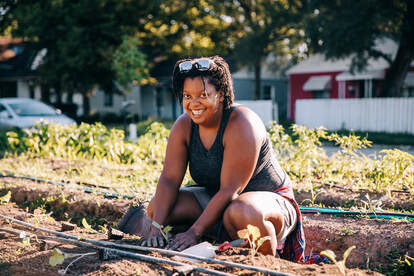
Soul Food Project spreads across several plots - and several goals. In 2018, I converted a derelict community garden into a market garden. I partnered with Purdue Extension and Marion County Soil and Water Conservation to improve the soil and grew on that lot for 2018 and 2019, selling most of the produce at a farm stand or at farmers markets. In Fall 2019, my aunt gave me permission to use her 3 lots to expand. I started building out this site in 2020, mainly relying on donations to purchase items. My goal is to have it partly operational by the 2021 growing season.
Last year, I grew vegetables (squash, tomatoes, peppers, lettuce, carrots, melons, cucumbers, kale, eggplant, onions, cabbage, collards, okra, and green beans). I have 12 chickens in my backyard whose eggs I sell at our farmstand. In 2020, I trialed a small CSA which I will continue in 2021 as a way to raise funds. I also did a weekly farmstand on our property as well to sell our produce. An interesting thing about my farmstand is that nothing I sell is more than $3. I try to subsidize our CSA as well to keep it affordable. I also accept food stamps.As I am the only farmer, a huge part of my work is my youth program.
Every year, I try to hire 3-5 teenagers from the neighborhood who want to learn how to grow. This program is called Youth Grow Indy. My goal isn't to make future farmers but future leaders, so I give the youth a lot of flexibility in designing their experience. For example, one youth was really interested in baking so we would spend afternoons experimenting with different ways to bake the vegetables into sweets. All of the revenue I make from selling veggies goes into paying the youth a living wage. This does limit how many youth I can hire but I strongly believe that I since I am in a black community that I have an obligation to create real jobs and that means paying them and not exploiting them for free labor.
My goal is for our Sheldon site to be our main hub where we can have gatherings (post covid) and educational classes. My goal is to have the farms not only provide food for the neighborhood but also to provide a greenspace. I'm very involved with my neighbors and I am the Vice-President of our neighborhood association and work closely with our community development corporation to ensure everything that I do is benefiting the neighborhood.
Last year, I grew vegetables (squash, tomatoes, peppers, lettuce, carrots, melons, cucumbers, kale, eggplant, onions, cabbage, collards, okra, and green beans). I have 12 chickens in my backyard whose eggs I sell at our farmstand. In 2020, I trialed a small CSA which I will continue in 2021 as a way to raise funds. I also did a weekly farmstand on our property as well to sell our produce. An interesting thing about my farmstand is that nothing I sell is more than $3. I try to subsidize our CSA as well to keep it affordable. I also accept food stamps.As I am the only farmer, a huge part of my work is my youth program.
Every year, I try to hire 3-5 teenagers from the neighborhood who want to learn how to grow. This program is called Youth Grow Indy. My goal isn't to make future farmers but future leaders, so I give the youth a lot of flexibility in designing their experience. For example, one youth was really interested in baking so we would spend afternoons experimenting with different ways to bake the vegetables into sweets. All of the revenue I make from selling veggies goes into paying the youth a living wage. This does limit how many youth I can hire but I strongly believe that I since I am in a black community that I have an obligation to create real jobs and that means paying them and not exploiting them for free labor.
My goal is for our Sheldon site to be our main hub where we can have gatherings (post covid) and educational classes. My goal is to have the farms not only provide food for the neighborhood but also to provide a greenspace. I'm very involved with my neighbors and I am the Vice-President of our neighborhood association and work closely with our community development corporation to ensure everything that I do is benefiting the neighborhood.
DeAnthony Jamerson, Legacy Taste of The Garden, www.legacytasteofthegarden.com

In 2016, Legacy Taste of the Garden started growing to sell. We grow a variety of garden vegetables such as tomatoes, cucumbers, peppers. I have a roadside wagon and stand to sell locally. We also participate in farmers markets in Evansville and Indianapolis, in the underserved communities.
Legacy was established for the purpose of promoting healthy diets; we made it our goal to interact and train the youth of the community to grow organic vegetables and fruit, and become part of a positive environment in which to raise families. Legacy participates and partners with youth organizations showing kids how to grow vegetables and the opportunities in agriculture.
Legacy was established for the purpose of promoting healthy diets; we made it our goal to interact and train the youth of the community to grow organic vegetables and fruit, and become part of a positive environment in which to raise families. Legacy participates and partners with youth organizations showing kids how to grow vegetables and the opportunities in agriculture.
Sharrona Moore, Lawrence Community Gardens, www.LawrenceCommunityGardens.org
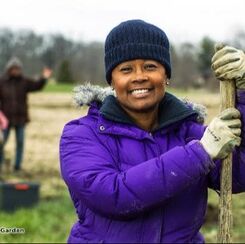
I have been managing Lawrence Community Gardens since it was established in 2016. We broke ground in 2017, and community and volunteer engagement have been the sole reason for our success.
Our youth program, Next Generation Farmers, is focused on teaching 12-15 year old kids a healthy sustainable lifestyle. Kids learn organic agriculture, earn a weekly stipend and profit sharing, learn small farm business skills, and at completion of the program they earn a Junior Master Gardener Certificate.
We have 27 chickens, 4 bee hives, a 75 ft hoop house and an on-site farm stand. Our youth grow food year round on 2 acres and make large produce donations to our local pantries regularly, which fights food insecurity for thousands of people for the Far Eastside of Indianapolis. We are also a worksite for Ground Work Indy and TeenWorks youth, who are paid an hourly wage through their organization to work at our farm.
Our youth program, Next Generation Farmers, is focused on teaching 12-15 year old kids a healthy sustainable lifestyle. Kids learn organic agriculture, earn a weekly stipend and profit sharing, learn small farm business skills, and at completion of the program they earn a Junior Master Gardener Certificate.
We have 27 chickens, 4 bee hives, a 75 ft hoop house and an on-site farm stand. Our youth grow food year round on 2 acres and make large produce donations to our local pantries regularly, which fights food insecurity for thousands of people for the Far Eastside of Indianapolis. We are also a worksite for Ground Work Indy and TeenWorks youth, who are paid an hourly wage through their organization to work at our farm.
Maeve Smith, Wilderlove Farm, www.wilderlovefarm.com
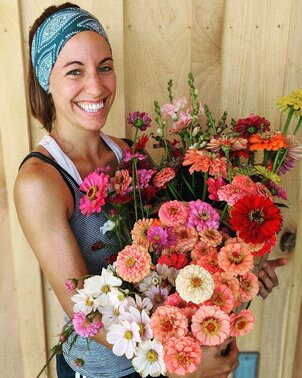
Wilderlove Farm is currently a 1-acre market garden primarily growing produce and fresh cut flowers. We are located in Bloomington, IN, where we sell our products primarily through two farmers markets, a personal online store, as well as restaurants. In the first growing season (2018), we only cultivated a 1⁄4 acre, but the farm has doubled in size each season since. The design of the farm was strategically to be a small footprint as the desire was to narrowly focus and master a few key crops (approximately 15) that are quick to mature and maintain a high profit margin. This smaller footprint also permitted the farm to keep initial startup costs lower by using primarily hand tools, requiring less large infrastructure, as well as needing fewer labor hours to maintain.
Another significant part of the farm’s DNA is its focus on soil biology, which has been the hardest learning curve for me since beginning to farm. I didn’t even know what I didn’t know when first beginning and still feel that way to some degree! Soil biology is critical to our farm because we believe that the nutrition of food is only as strong as the health of the soil its grown in. One of my favorite aspects of being a farmer is discussing food preparation and cooking experiences with our customers surrounding the produce that we sell. It gives me an incredible amount of joy knowing that the farm is striving to provide each person with the most nutritionally dense food available to them through the practices and methods that are implemented.
Another significant part of the farm’s DNA is its focus on soil biology, which has been the hardest learning curve for me since beginning to farm. I didn’t even know what I didn’t know when first beginning and still feel that way to some degree! Soil biology is critical to our farm because we believe that the nutrition of food is only as strong as the health of the soil its grown in. One of my favorite aspects of being a farmer is discussing food preparation and cooking experiences with our customers surrounding the produce that we sell. It gives me an incredible amount of joy knowing that the farm is striving to provide each person with the most nutritionally dense food available to them through the practices and methods that are implemented.
